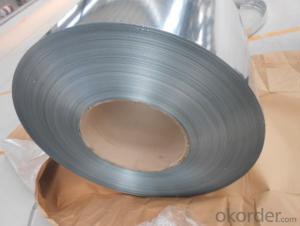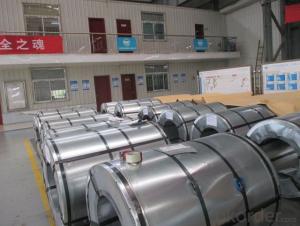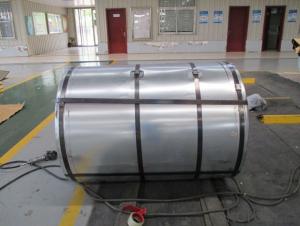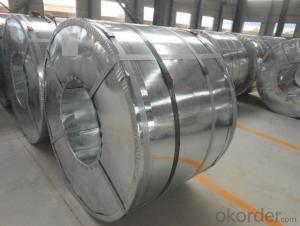STAINLESS STEEL COILS with thickness 2mm
- Loading Port:
- China Main Port
- Payment Terms:
- TT OR LC
- Min Order Qty:
- -
- Supply Capability:
- -
OKorder Service Pledge
OKorder Financial Service
You Might Also Like
STAINLESS STEEL COILS
Packaging & Delivery
Packaging Detail: seaworthy export package
Delivery Detail: on request
Specifications
1. more than 10 years’ experience on this field
2. advanced equipments
3. competitive price
4. soonest delivery
Product Description :
Commodity
STAINLESS STEEL COILS
Technical Standard: Steel Grade &Standard:J1
Surface Treatment:NO.1
Hot rolled Annealed and Pickled(HRAP)
Grade: J1 , Prime quality
Mill Edge. No connection point in each coil.Component: Ni:1% , Cu: 0.65-0.9%, Cr: 13%, Mn: 10–12%, C: 0.09-0.12%
Package:Properly packed for ocean freight exportation in 20''container
Application::home appliances, constructions, building, machineries
Our Advantages :
1. Expertise:
More than 10 years of manufacture: we know how to properly handle every step of production.
2. Competitive price:
We can offer competitive prices to our customers.
3. Accuracy:
We have excellent technicians and leaders, which can ensure our products are exactly what you want.
4. Materials:
All steel coils are made of high-quality raw materials.
5. Certificate:
Our products are certified by ISO9001.
6. Productivity:
We have large-scales of production lines,, which can guarantee all your orders will be finished in earliest time.
The furnace heating style: improved Sendzimir heating technology
Hourly output: max.76.3t/h
Process after coating: tension leveling, Passivation or oiling
Our Service
Our quality
Test Equipments of Prepainted Galvanized Steel Coil : Salt-spray tester; Atomic absorption spectrophotometer; Rockwell typer hardness tester; Tensile test machine; Metrohm titration; Laboratory Bend test machine.
Our packing
Properly packed for ocean freight exportation in 20''container, galvanized metal fluted rings on inner and outer edges, galvanized metal & waterproof paper wall protection disk, galvanized metal & waterproof paper around circumference.
R&D department
R&D department concentrates on researching and developing reliable products with best quality. The quality department test and control every process of production to guarantee the best quality of product
- Q:I'm a hiker and cook on a camp fire with a canteen cup. So which would be a better material for cooking on a campfire with, aluminum or stainless steel?
- I added a few more pieces. Love the glass lids. I have a couple pieces of Le Creuset, but it is too heavy even before the food goes in and I don't like dealing with it. I regret buying the Le Creuset now---should have just bought the Lodge Enameled Cast Iron stuff for about a fourth of the cost. I do have a Lodge 5 qt. dutch oven that I use to deep fry and it is a nice piece and easy to clean. The LC dutch oven does a nice job when I want stew-type recipes.
- Q:How are steel coils processed before they are used in manufacturing?
- Steel coils undergo several processing steps before they are used in manufacturing. The first step is called pickling, where the coils are immersed in an acid bath to remove any surface impurities, such as rust or scale. This helps to improve the surface quality of the steel. After pickling, the coils go through a process called cold rolling. This involves passing the coils through a series of rollers to reduce their thickness and improve their dimensional accuracy. Cold rolling also enhances the mechanical properties of the steel, making it stronger and more durable. Next, the coils are annealed, which involves heating them to a specific temperature and then slowly cooling them. Annealing helps to relieve internal stresses in the steel and improves its formability and ductility. Following the annealing process, the coils may undergo additional surface treatments, such as galvanizing or coating. Galvanizing involves applying a layer of zinc to protect the steel from corrosion, while coating can involve applying various types of paint or polymer to enhance the steel's appearance or provide specific functionalities. Once the coils have been processed and treated, they are typically cut into smaller sheets or strips, depending on the manufacturing requirements. These sheets or strips can then be used in various manufacturing processes, such as stamping, forming, welding, or fabrication, to create a wide range of products, including automotive components, appliances, construction materials, and many others. In conclusion, steel coils undergo a series of processing steps, including pickling, cold rolling, annealing, and surface treatments, before they are ready to be used in manufacturing. These processes improve the quality, strength, and formability of the steel, allowing it to be transformed into a variety of products.
- Q:Is it just because brass is reloadable? But what makes it reloadable? What does brass bring to the equation that the steel cased ammo can't do?
- When 9mm was short I bought some steel Tula ammo, it was cheap and available. When at the range I was shooting it and it sounded different and felt different, way less kick. So I loaded up a mix of Tula and some Federal. Big difference between them. I also had failure to eject on the steel, then put brass in and did not have that problem. I do not buy cheap steel ammo anymore.
- Q:Can you reload spent casings if they are steel?
- Technically they are reloadable but it's way too much effort and it'll probably cost more to do than its worth. I know you're probably asking this for surp. 7.62x54r right? The steel will have to be fully resized every time and you should only do it 1-2 time max to be safe. Also if your ammo is berdan primed the primers are very hard to find and these are a whole different beast than boxer primed. Short answer is yes but not worth it IMO.
- Q:My company want to welding stainless steel, do not know to use what welding machine?
- Stainless steel is a fascinating metal to weld. Welding stainless can be difficult if you don't know what you are doing. It reacts to excessive heat by warping and distorting once it cools. Everything shows up in stainless. If you weld with too much heat you can see it by the heat marks left in the metal along with any distortion. It also scratches very easily so you must take care when welding on a metal table. Stainless steels can be welded using several different procedures such as shielded metal arc welding, gas tungsten arc welding, and gas metal arc welding but stainless steel welding wires have been developed for welding stainless steels.
- Q:What are the different methods of tension leveling for steel coils?
- There are several methods of tension leveling for steel coils, each with its own advantages and applications. 1. Roller leveling: This method involves passing the steel coil through a series of rollers under high tension. The rollers are strategically positioned to apply pressure on the coil, effectively stretching and elongating it. Roller leveling is commonly used for thinner gauge coils and is effective in removing coil set, crossbow, and edge wave defects. 2. Stretch leveling: In this method, the steel coil is subjected to a combination of tension and elongation. The coil is gripped by clamps at both ends and then stretched using hydraulic or mechanical devices. This process helps to remove residual stresses, flatten the coil, and improve shape control. Stretch leveling is particularly suitable for thicker gauge coils and can effectively eliminate wavy edges and center buckle. 3. Temper rolling: This method involves passing the steel coil through a series of temper rolls, which apply pressure on the surface of the coil. Temper rolling is primarily used to improve the surface finish of the steel and enhance its mechanical properties. It can also help to reduce coil set and improve flatness. 4. Skin pass rolling: In this method, the steel coil is passed through a series of rolls that apply a light pressure on the surface. Skin pass rolling is typically performed after the primary leveling process to further improve surface finish, enhance flatness, and reduce surface defects such as scratches or marks. 5. Stretcher leveling: This method involves clamping the steel coil at both ends and then applying tension to stretch it. The stretched coil is then held in this position for a period of time to allow for stress relief and shape correction. Stretcher leveling is commonly used for thicker gauge coils and can effectively remove coil set, crossbow, and center buckle. Each of these tension leveling methods offers unique advantages and is suitable for different types of steel coils and specific requirements. The choice of method depends on factors such as coil thickness, desired flatness, surface finish, and the specific defects that need to be corrected.
- Q:How do steel coils contribute to thermal insulation in buildings?
- Steel coils do not contribute to thermal insulation in buildings. In fact, steel is a good conductor of heat, so it can actually transfer heat rather than insulate against it.
- Q:If needed for Defence could a stainless steel sword kill someone my buddy wanted this sword for Defece after it is sharpend here is a picture
- Stainless steel only works for knives, anything past 12 inches it starts getting brittle, carbon steel is what you are looking for. As far as home defense, if you don't know how to use it, you will be worse off.
- Q:Can steel coils be coated with zinc?
- Yes, steel coils can be coated with zinc through a process called galvanizing. This coating provides protection against corrosion and increases the durability and longevity of the steel coils.
- Q:How are steel coils inspected for uniformity?
- Steel coils are inspected for uniformity through visual examination and various non-destructive testing techniques. These include measuring the dimensions and weight of the coils, checking for any surface defects or damages, and conducting magnetic particle or ultrasonic testing to detect any internal flaws or irregularities. Additionally, the coils may undergo chemical composition analysis to ensure uniformity in the steel's properties.
1. Manufacturer Overview |
|
|---|---|
| Location | |
| Year Established | |
| Annual Output Value | |
| Main Markets | |
| Company Certifications | |
2. Manufacturer Certificates |
|
|---|---|
| a) Certification Name | |
| Range | |
| Reference | |
| Validity Period | |
3. Manufacturer Capability |
|
|---|---|
| a)Trade Capacity | |
| Nearest Port | |
| Export Percentage | |
| No.of Employees in Trade Department | |
| Language Spoken: | |
| b)Factory Information | |
| Factory Size: | |
| No. of Production Lines | |
| Contract Manufacturing | |
| Product Price Range | |
Send your message to us
STAINLESS STEEL COILS with thickness 2mm
- Loading Port:
- China Main Port
- Payment Terms:
- TT OR LC
- Min Order Qty:
- -
- Supply Capability:
- -
OKorder Service Pledge
OKorder Financial Service
Similar products
New products
Hot products
Related keywords






























